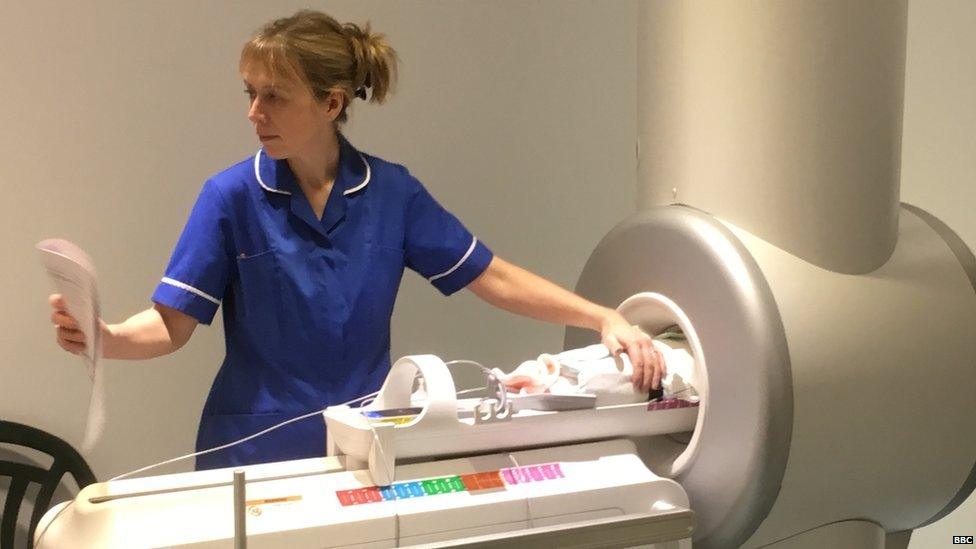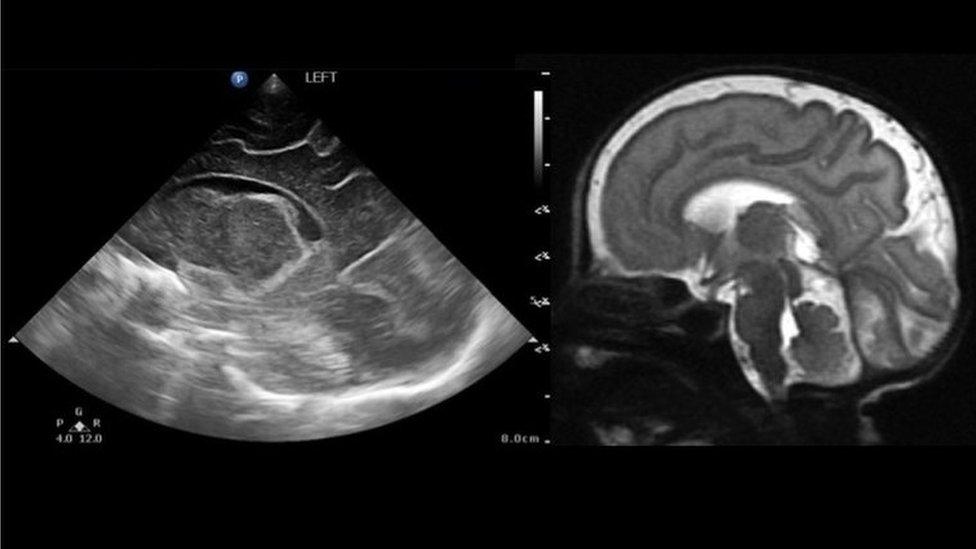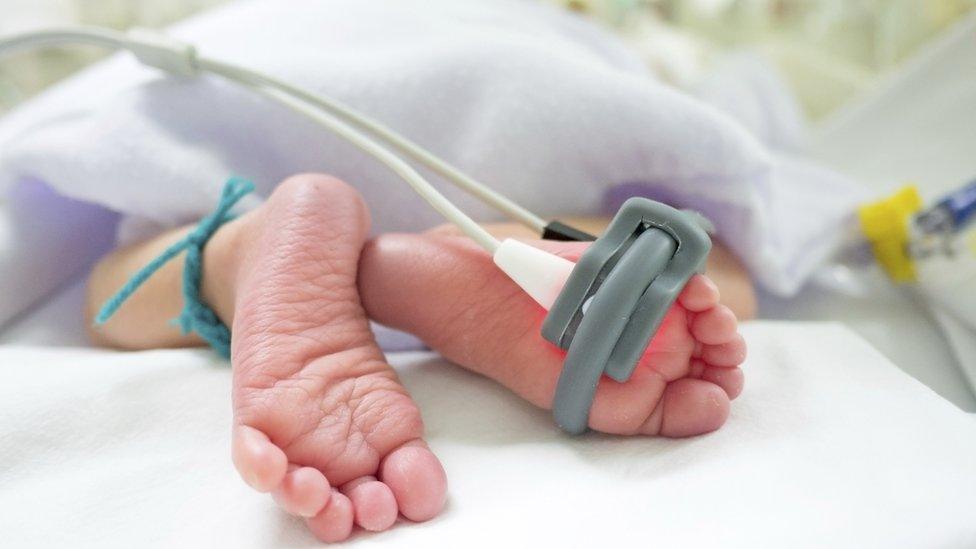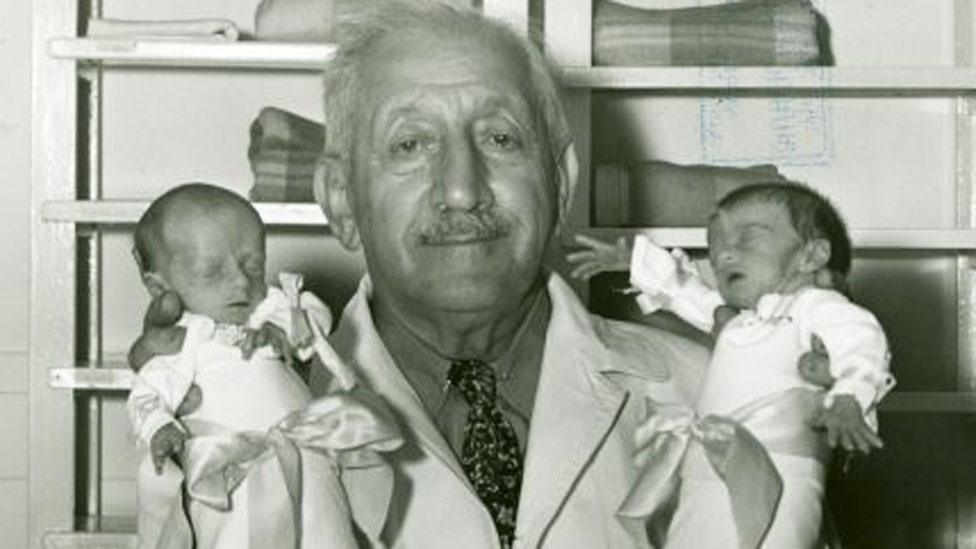World's smallest MRI helps tiny babies
- Published

This is one of only two purpose-built neonatal MRI machines in the world
Doctors in Sheffield are pioneering the use of a compact MRI scanner for imaging the brains of premature babies.
The machine, at the Royal Hallamshire Hospital, is one of only two purpose-built neonatal MRI scanners in the world.
At present, ultrasound is normally used to scan the brains of newborns.
Prof Paul Griffiths, of the University of Sheffield, said MRI was better at showing the structures of the brain and abnormalities more clearly.
Clearer images
So far about 40 babies have been imaged in the MRI scanner, which was built by GE Healthcare with funding by the Wellcome Trust.
See the scanner - one of only two in the world - in action
One of them, Alice-Rose, was born at 24 weeks and had two bleeds in the brain.
Her parents, Shaun and Rachael Westbrook, said the MRI scan was very helpful.
Shaun told me: "It's a much crisper image and a lot easier to understand than the ultrasound."
Rachael added: "It's been a rollercoaster since Alice-Rose was born on 6 November: not everything was fully formed, and she still weighs only 2lb 13oz (1.28kg).
"The MRI was reassuring as it meant you got a better look at her brain."
Ultrasound of the brain is possible in newborn babies only because the bones in their skull are not yet fused.
Ultrasound v MRI
The sound waves can travel through the two fontanelles - the soft spots between the bones.
Prof Griffiths said: "Ultrasound is cheap, portable and convenient, but the position of the fontanelles means there are some parts of the brain which cannot be viewed.
"MRI is able to show all of the brain and the surrounding anatomy, making the images easier to explain to parents.
"From a diagnostic point, the big advantage is that MRI is able to show a wider range of brain abnormalities, in particular those which result from a lack of oxygen or blood supply."

Ultrasound image (left) of Alice-Rose with MR image (right). The MRI shows the structures of the brain with greater clarity
MRI scans are rarely performed on severely premature babies because the risks involved in transferring and handling a sick infant can outweigh the benefits.
Prof Griffiths said: "MRI machines are huge, heavy objects which are sited in the basement or ground floor of hospitals, whereas maternity units are usually higher up, or in a completely different building, so it can mean a complicated journey to get a baby to and from the scanner."
Evelina Children's Hospital in London has a full-size MRI scanner within the neonatal intensive care unit.
The compact baby MRI machine at the Royal Hallamshire is not much bigger than a washing machine and just metres away from the neonatal intensive care unit, meaning that specialist staff are on hand in case of problems.
The concept for a dedicated neonatal scanner was originally developed more than a decade ago by Prof Griffiths and Prof Martin Paley, of the University of Sheffield.
Two prototype 3 Tesla neonatal MRIs were eventually built - the other is in Boston Children's Hospital in Massachusetts - although it is no longer in use.
Neither machine has regulatory approval for clinical use, and both remain purely for research.
Prof Griffiths said the next step would be to do a trial in premature babies to show definitively that MRI produces a better diagnosis and whether it altered the clinical management of children.
It is not known how much a neonatal MRI machine would cost, should the system eventually get commercialised, but full-size scanners are typically priced at several hundred thousand pounds.
Cincinnati Children's Hospital has a 1.5 Tesla neonatal MRI scanner that was adapted from adult orthopaedic use.
- Published13 April 2016

- Published23 May 2016
